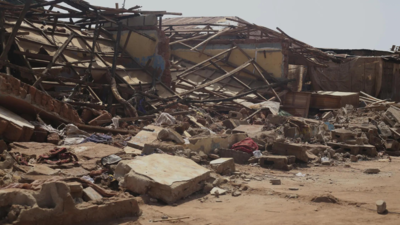ARTICLE AD BOX

Nigeria: The true cost of separatist sit-at-home protests
Monday mornings in Onitsha, one of West Africa's busiest commercial cities, used to be the most chaotic day of the week. But these days, they unfold in eerie silence. The familiar blare of traders haggling prices has faded — replaced by an unsettling stillness as many residents of southeastern Nigeria live in fear.The outlawed Indigenous People of Biafra (IPOB) movement — which is pushing for the independence of Nigeria's southeast — regularly calls for stay-at-home protests to demand the release of its leader, Nnamdi Kanu.Kanu is on trial on terrorism charges in the Nigerian capital, Abuja.While the IPOB claimed it had suspended the stay-at-home order, locals continued to comply due to the fear of armed groups known to attack those who defy the measure, using enforcement tactics like arson, looting and targeted killings."Mondays now feel so empty," said Gift Chigo, a resident in Imo, one of the hardest-hit states in the region."Businesses are shut down and shops locked down. And to be honest, we don't necessarily sit at home because we support the IPOB, but out of fear. It's not about solidarity, it's about [protecting] ourselves. What can we do? Nothing," she told DW.
Nigeria labels IPOB a terrorist organization
Formed in 2012 by two UK-based Nigerians, Nnamdi Kanu and Uche Mefor, the IPOB has been at the forefront of the renewed call for an independent state of Biafra.
Former Eastern region governor and military officer, Emeka Ojukwu, had declared the defunct state of Biafra in the 1960s following the killing of Igbos in northern Nigeria. However, that attempt to secede from the country ended with a bloody three-year civil war that led to the death of millions of people.The agitations still persist with groups like IPOB. In 2020, the IPOB launched its armed wing called the Eastern Security Network aimed at protecting the Igbos, but residents told DW it has instead inflicted more suffering on them.Since Kanu's arrest, the group has split into factions — some of which are more violent, exerting considerable influence and power, especially in rural communities, and targeting government facilities.Although IPOB has repeatedly dissociated itself from the region's violence, authorities have continued to accuse the group of several violent incidents in the area. The Nigerian government has labelled the group a terrorist organization.
The cost of a sit-at-home order
Apart from the sit-at-home protest every Monday, the region also observes the order on days Kanu appears in court. And, it has not only upended livelihoods and disrupted the economy of the region, but it has also led to the death of more than 700 people over the past four years.A recent report by SBM intelligence, a Lagos-based think tank, shows that the protest has resulted in economic losses of over $4.79 billion (€4.20 billion) with key sectors like transportation, trade, and micro businesses taking the biggest hit.In about 332 violent incidents, the protest's epicenter has been Imo state, where 332 people were killed, followed closely by neighboring Anambra with 202 deaths. Many of the victims were civilians who defied the weekly order or became caught up in clashes between the group and Nigerian security forces.Public institutions like schools and hospitals have also been disrupted by the protest."I go to class three times a week even though I teach mathematics which was supposed to be taught every single day.
We're seriously lagging behind due to the IPOB's order," King David, a teacher in Owerri, told DW.
Schools suffer, economy stalls
Dengiyefa Angalapu, a research analyst at the Centre for Democracy and Development, a think tank, shared David's concern. He noted that the educational sector has borne the most profound brunt of the sit-ins in the region."Students preparing for exams often miss critical academic days or are even forced to travel under risky conditions," said Angalapu.
"Beyond that, students missing out on school every Monday means they only have four days to learn, and I think that's really a very critical gap compared to other regions in the country."While there was a high rate of compliance with the order in 2021, representing about 83%, actual support is much lower now — about 29%.Nigeria's southeast is inhabited predominantly by the Igbo ethnic group who are known for their entrepreneurial skills.
The impact of the sit-ins has been substantial, and these losses are not just contained in the southeast, said Ikemesit Effiong, head of research at the Lagos-based think tank."People from the Niger Delta and the South South region who are looking to transit through the South East to get to other parts of the country are also materially affected because their goods cannot move over land through the region."Effiong mentioned that the loss in productivity has weakened economic competitiveness and discouraged external investments."The economic loss in terms of reduced investability climate in the region is worrisome. Many projects that would have been greenlit have actually been held back or rerouted to other parts of the country because the cost of doing business has increased in the South East," he said.
What's the way out?
Dengiyefa said that, beyond economic loss, deepening unemployment and poverty, what lies ahead is even more staggering."It's quite sad that a generation of youth are being raised in the southeast in a climate of fear and ideological extremism," Dengiyefa noted.Dengiyefa added that "with the intergenerational transfer of trauma, we're at a very big risk if this continues because we've a whole generation that has been radicalised and that's a very fundamental challenge."Dengiyefa suggested that the Nigerian government should invest in countering secessionist narratives, including engaging local leaders."We need a non-military security presence such as community policing rather than having solely the armed forces which often escalate tensions" that would eventually lead to a peaceful dialogue for any political demands.Both analysts argued that the heavy-handedness of Kanu's prosecution could be softened through government transparency and fair judicial process."People may not approve of Nnamdi Kanu's tactics within the region, but his message still has deep resonance. Many people see his treatment as emblematic of how Nigeria has generally treated the Southeast. So, changing that paradigm and changing that perception will be critical," Effiong added.



.png)
.png)
.png)
















 1 day ago
8
1 day ago
8









 English (US) ·
English (US) ·